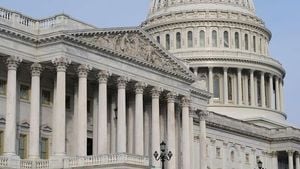The PlayStation Network (PSN) witnessed unprecedented global outages beginning late Friday evening, February 7, 2025, leaving thousands of gamers unable to access online services, play popular titles, or even utilize basic applications. What started as reports of service interruptions quickly mushroomed, affecting users across the globe. This outage has drawn comparisons to the infamous 2011 PSN outage where millions of accounts were compromised.
Users took to social media platforms, particularly X (formerly Twitter), to vent their frustrations over being locked out of their games. One user, Ramos, voiced the collective sentiment: "PSN down on a Friday night is criminal." The outage lasted over 14 hours, during which players experienced severe access issues not only to online multiplayer but also for various offline titles due to network authentication requirements.
On Saturday, the PSN status page confirmed the unavailability of multiple services, which were supposed to be functional. Features like account management, access to the PlayStation Store, gaming functions, and social features were all impeded, leaving many users bewildered. Reports indicated the outage began around 9 PM Brasília time, or 6 PM ET, but players across all time zones experienced disruptions.
Adding to the frustration, players noticed their offline games were rendered unplayable due to persistent login authentication errors. This raised serious questions about Sony's reliance on constant network connectivity even for single-player experiences. One frustrated player tweeted, "You cannot play offline games since PSN is down. A total failure from Sony after 15+ hours now!"
EA's latest football simulation, EA FC 25, became one of the most affected games. While users on other systems could access EA servers without issue, PlayStation gamers found themselves sidelined. The online modes of popular games including Call of Duty: Modern Warfare III, Fortnite, and GTA Online faced crippling downtime. Players were left unable to enjoy anticipated weekend gaming events, causing many to demand compensation from Sony for the extended interruption on what is typically peak gaming time.
Sony's official communication during this issue has been minimal, with only one post acknowledging the problem. The statement read: "We are aware some users might be currently experiencing issues with PSN." Yet, no specific details about the cause of the outage have been disclosed, and no timeline for restoration of services has been provided. This lack of transparency has led to widespread speculation among users about the underlying issues causing the disruption.
Theories about the cause of the outage range from routine server maintenance failures to possible DDoS attacks targeting Sony's infrastructure. Given the scale and severity of the outage, speculation is rife. Some users have suggested the service may have been overwhelmed due to unexpected user traffic, reminiscent of prior outages which resulted from similar spikes.
Even as players remained hopeful for swift restoration, many voiced their frustration over current digital rights management (DRM) issues. This situation underlined the growing concerns about players’ reliance on digital access to the content they own. One player stated, "This PSN failure reinforces why we need more control over our purchased games, especially when we've bought and own them without additional verification."
The outage has prompted some to evaluate alternatives to the PlayStation ecosystem. Users have started eyeing competitors like Xbox, where services have remained more stable during similar incidents. There's also been chatter about potentially switching to PC gaming, which often sees fewer server-related pitfalls.
Looking forward, gamers expect Sony to proactively address the issues moving forward. Players are expressing desires for increased cybersecurity measures to protect against possible attacks, along with improved server infrastructure to handle user loads more efficiently. Greater transparency during outages, including timely communication about the nature of the problems and expected resolution timelines, is also on the wish list for many.
This PSN outage has not only revealed the fragility of network-dependent gaming but also reignited discussions on ownership rights for digital games. Many hope this incident will encourage Sony to re-evaluate how they manage access to their services and the way they communicate with their paying subscribers, as their commitment to service continues to be under serious scrutiny.



